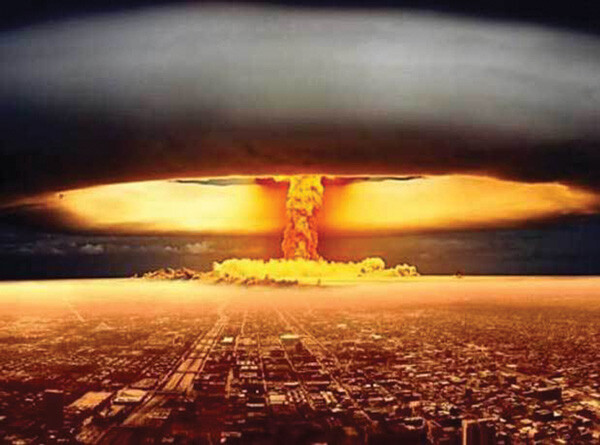Nuclear Twits Twittering
 Solemn thoughtfulness and studious deliberation don’t come to mind when the word “tweet” is mentioned. I imagine sports scores or birthday announcements. So when Mr. Trump said something on Twitter about nuclear weapons last Thursday, I thought he was trying to trivialize the issue and make the Bomb appear small. The man reportedly said “The US must greatly strengthen and expand its nuclear capability until such time as the world comes to its senses regarding nukes.”
Solemn thoughtfulness and studious deliberation don’t come to mind when the word “tweet” is mentioned. I imagine sports scores or birthday announcements. So when Mr. Trump said something on Twitter about nuclear weapons last Thursday, I thought he was trying to trivialize the issue and make the Bomb appear small. The man reportedly said “The US must greatly strengthen and expand its nuclear capability until such time as the world comes to its senses regarding nukes.”
This sort of gibberish has come to be expected from the Twitterer in Chief who doesn’t even know the world presently coming to is senses regarding nukes.
On December 23, the UN General Assembly approved an historic resolution to begin negotiations in 2017 on a treaty banning nuclear weapons. The vote follows an Oct. 27 decision by the UNGA First Committee to begin work on the new treaty despite opposition from several but not all of the nuclear-armed states.
The resolution passed with 113 voting in favor, 35 voting against, and 13 abstaining. Contrary to President Barak Obama’s much-reported wish to seek “a world without nuclear weapons,” the US delegate voted against the resolution, along with the other nuclear armed states England, France, Russia, and Israel. But not all nuclear-armed nations followed the US lead in opposing the ban. China, India and Pakistan all abstained, and North Korea, Iran and Italy all voted in favor. (Italy deploys up to 90 US nuclear weapons at two of its air force bases.)
Over US objections, the negotiations will held in two sessions at UN headquarters in New York from March 27 to 31, and from June 15 to July 7. During a UN budget committee meeting in December, the US delegation fought against a funding request for the planned four weeks of negotiations. Luckily, the US withdrew its opposition under pressure from supporters of nuclear disarmament and the funding was Okayed.
In a leaked document sent to NATO members in October, before the UN First Committee decision, the US told its allies to oppose the resolution and to boycott the negotiations. Officially the US is worried that a treaty ban will demolish the perception that nuclear weapons are legitimate. An international ban would also make it politically embarrassing for NATO to continue its nuclear war planning. The US marching orders were disobeyed by several allies The Netherlands, India, and Pakistan which all abstained (and by Italy’s “yes”).
Any military consideration of the size and threat ability of the US nuclear arsenal finds it overwhelming and redundant. President-elect Trump’s own nominee to head the Pentagon, General James Mattis, has questioned the retention of the Minuteman III missile system, telling the Senate Armed Services Committee in January 2015, “You should ask, ‘Is it time to reduce the triad to a ‘diad,’ removing the land-based missiles?’” Gen. Mattis is a personal friend of former Defense Secretary William Perry who has repeatedly called for completely eliminating the land-based missiles. “Perry thinks the US nuclear force no longer needs land-based intercontinental ballistic missiles, or ICBMs,” the AP has reported. ICBMs should be scrapped, because, Perry says, “They’re not needed.”
In 2014, Lt. General James Kowalski, Vice Commander of US Strategic Command, said, “The greatest threat to my force is an accident. The greatest risk to my force is doing something stupid.” Gen. Kowalski’s assessment is more alarming than the alleged risk to US forces posed by Russia which is now surrounded by NATO members and US allies.
In 2012, a blue-ribbon commission chaired by General James Cartwright, a former Vice Chairman of the Joint Chiefs of Staff and a former commander of US nuclear forces also called for eliminating the Minuteman missiles. The Cartwright report, which was signed by Senator Chuck Hagel—who would later become the Secretary of Defense—concluded that a US nuclear weapons arsenal with none left on ICBMs was big enough. At a 2012 Senate hearing, Gen. Cartwright testified that the ICBMs could be eliminated without leaving the US at risk.
During the campaign, President-elect Tweet deliberately made light of bullying, sexual assault, the beating-up of critics, the arrest, detention and deportation of millions, and the deliberate killing of women and children in Syria and ISIS. So it’s not surprising that the man knows next to nothing about the overwhelming explosive, incendiary, and cancer-causing power of H-bombs. The Nobel Peace Prize-winning Physicians for Social Responsibility have studied the subject for 4 decades, and it reported in 2014 that only 100 nuclear warheads -- if detonated -- could plunge the Earth into a smoke-clouded darkness that would last long enough to destroy agriculture and starve billions of people to death. The United States has 7,000.